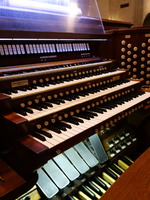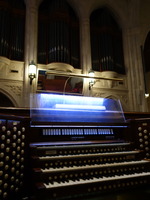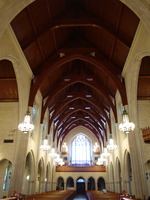This is the eleventh and penultimate installment in a series on my take on playing the twelve large works of César Franck. Today’s topic is the Grande Pièce Symphonique. See the first post in the series for background information.
********************
I love that cop-out title Franck came up with. He was trying to help the organ grow up as a recital instrument, and he composed here what became the French prototype of the solo organ Symphony. And the best he could come up with for a title was “Big Symphonic Piece.” I just love that.
This piece (the GPS in my casual references) seems to be the most experimental piece Franck wrote. It continues an idea of short, multiple movements played without pause, which he explored in his first published organ piece, the Fantaisie in C, which I cover last in this series). The GPS is the only one of its kind in Franck’s output, and it was early in his oeuvre, yet it was in a new style that his successors seized on and took the organ world by storm with. Because it is so experimental, it is full of…uh…experiments. Franck was testing this idea here, that idea there, pulling here, pushing there. As a result, this twenty-some-minute piece is absolutely full of melodic fragments, repeated ideas, and expanding formal structure. The greatest danger lies in all the fermatas (of which I count 23, an average of one every 25 measures, plus an additional 7 instances of Franck writing a pause via extended rests without fermatas). Franck is constantly coming to a halt here, pausing there, lingering there. The piece is much like an improvisation, an approach to which could be a life-changing experience. The number of fermatas is not excessive, but I have heard performances where we could order pizza during the pauses! And so if you’re not careful, this piece could end up sounding like a glorified organ demonstration, which would kill not only the piece but also the listener.
Technical difficulties aside, the GPS is so motivic and fragmented that it may represent the biggest musical challenge of the entire series. I have performed this piece only once. I learned it in college in 1990 to commemorate the 100th anniversary of Franck’s death. My teacher and the studio were able to perform all twelve works in three recitals during a wonderful weekend of study of French music for organ and for organ and brass. I also wrote a paper on this piece in grad school. I was using it in a Grundgestalt analysis, as well as a complete formal analysis. (Made an A+ on it. Still have that paper, of course.) But I have not been moved to re-present the piece in public since then, until I started on my way through all twelve pieces. It’s a tough piece to pull off due to the difficulties discussed above, and I have never been satisfied with live performances I have heard, so I have been slow to try my hand at it as a professional.
This piece is long, but it recycles themes. Therefore, it might help you (and your listeners) if you have an overarching goal in mind. Decide exactly where you want the piece to make its thesis statement. There are several choices, such as the first appearance of the main theme in 64, the re-visitation of all primary themes beginning in 424, the only appearance of the main theme in major mode beginning at 472, or the tenor solo suggesting a Tuba (which Franck didn’t have) beginning in 540. In any event, if you can keep looking ahead (or back) to the “thesis” you define for the piece and keep fermata overload in check, your audience will survive it better.
Beginning: This is not the main theme. It’s a “stitching” theme that introduces the whole piece here and ties various sections together later. Because it is important background but not primary foreground, don’t dwell on it too much; the real meal will arrive in 64! Nevertheless, this introduction has some beautiful moments in it – measures 43-56 are perfectly ravishing.
Opening registration: You may need to adjust registration to make the melody audible.
Measure 6: This, too, is introductory material, but it will be elevated in status later on by being given its own intermezzo of sorts beginning in 192.
Measure 25: The introductory theme finally gets to roll along without stopping. If you discover that you tend to move the tempo here, then consider using that same tempo at the very beginning, at least as a subtle background guide to everything up to this point.
Measures 35-41: Be sure the left hand and Pedal trade off evenly, without blurring or breaks between notes, and without changes in tempo.
Measure 60: Franck says non troppo e maestoso!! Sometimes I want to stand up and say that aloud in live performances.
Measure 64: Notice that Franck is notating in exact rhythms what later composers would do with staccato marks, with the directive in their teaching and publications that staccato notes to the French organist are simply (and exactly) half-value. Since Franck uses exact notation, then the more exactly those notes and rests are presented, the better.
Measures 70, 90, 100, 123, 131: You’ll need to decide for yourself if you want to separate those half notes like the separated eighth notes and eighth rests throughout the rest of this main theme. I can go either way and have no biased advice.
Measures 113-117: Be sure all cutoffs are consistent among the parts!
Measures 139, 141: Notice that the manuals cut off, but the Pedal continues legato.
Measures 192 and following: This might not need to go as fast as you might think. I believe that your desired tempo at 231 should guide selection of tempo for 192. Throughout this entire section, be sure the right hand stays absolutely steadfast in its rhythm. We don’t want the higher note of any given beat in the right hand to be mistaken for the beat. Cleanliness is next to godliness.
Measure 261: It is so very tempting to play this movement Largo, but he marked it Andante. The quarter note must rule the tempo, and if you trust that as you go, then the movement makes more sense. Use your preferred tempo at 277 to determine tempo at 261, and then don’t speed up in 277 just because the texture gets easier! This movement is also difficult because Franck registers the melody on a non-expressive division (at least for the organ he played regularly).
Measures 277-281, 297-301: I don’t break between manuals, but I have no objection to breaking.
Measure 303: Strange registration! Go with it and see how it sounds. Don’t take this section as fast as it looks – those sixteenth notes are not textural – they are melody! Perhaps your preferred tempo at 343 should dictate the tempo for 303.
Measures 343-374: If you discover that this section keeps slowing down, it’s probably the left hand’s fault. The initial sixteenth rest on each beat tends to get overblown after awhile, which grinds everything to a halt. A good fix is to listen to the melody and require the accompaniment to keep up, rather than try to move the accompaniment along on its own steam.
Measures 410-415: The right foot has a decision to make between lunging for each note and just breaking proudly and gently between notes. I’ll take detaching over panicking any day.
Measures 417-418: It’s rare to see an accented note in organ music (how do you execute that?). Franck could just tap his box lever open, and the box would swell and then spring shut again. You can experiment with your own swell shades and see if you can achieve the same effect. Depending on the organ, the room, and your creativity, you may be able to play the accented notes on two manuals and then release one of them before the second beat. But that seems much ado.
Measures 422-423: The Pedal notes will disappear if you don’t have some independent 8-foot stops drawn for them. (Franck doesn’t call for pedal couplers there, anyway.)
Measures 472-500: Some performers just can’t seem to play this section fast enough to suit themselves, and others of us are blue in the face from pointing out that Franck wants this theme played much more grandly than it has been up to this point. This is the only time this theme appears in major mode, and it’s in the rather grand-but-dark key of F-sharp. I beg you – don’t confuse this section with the Sowerby Pageant! You can pick a faster tempo at 502.
Measures 540-569: The left hand part in this section begs for a solo party horn of some sort (which Franck didn’t have). But if you do and it’s not too brash, go for it. I recommend playing it through the downbeat of 570 and then moving off of it.
Measures 582- 587: Legato pedal and detached manuals seems instinctive to a lot of players. Go with your instincts.
Measure 592: Those three beats of rest bother me. I’m always afraid someone will mistake them for the end and start to applaud. On the other hand, the piece is over, and so I had better prepare those rests perfectly. The choice of tempo from 582 will be very important for pacing through 592 and for proclaiming that the piece really is over.
Measures 593-594: Franck’s voicing of those chords has been discussed by others. They are indeed strange, and it can leave the listener wondering if it’s really over. I do not advocate adding extra notes to “fill things out.” I believe your handling of all that has come before will be crucial toward making this last page make sense and concluding this most epic of all of Franck’s organ pieces.
 Saturday, July 11, 2015 at 10:51AM
Saturday, July 11, 2015 at 10:51AM  Joby Bell | tagged
Joby Bell | tagged  New models
New models 


